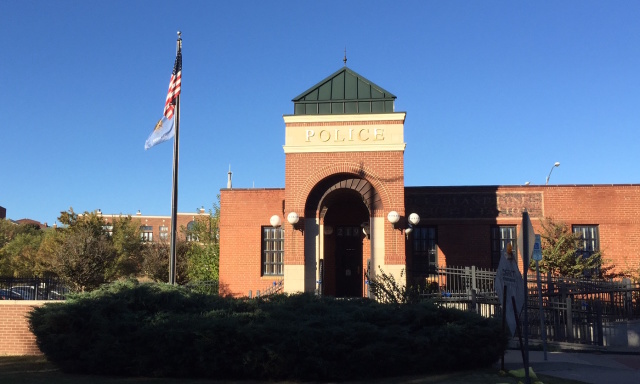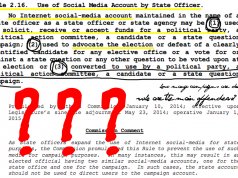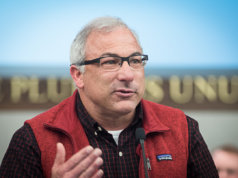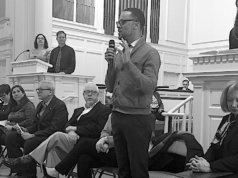Acclaimed filmmaker Quentin Tarantino won’t be selling many tickets for his latest movie to Oklahoma City police officers.
NonDoc has learned that the Fraternal Order of Police Lodge 123 — a union group representing 1,600 OKC officers — plans to release a statement this week expressing solidarity with other U.S. police unions that are boycotting The Hateful Eight, which is set to open on Christmas.
The nationwide union boycott comes as a response to Tarantino’s remarks at an Oct. 24 demonstration in New York arranged by the Rise Up October activist group. The filmmaker marched with numerous African Americans protesting incidents of unarmed black men being slain in conflicts with police. In particular, the group spoke about the cases of Tamir Rice and Eric Garner.
Meanwhile, police groups criticized the October march and Tarantino’s comments as inappropriate in light of Randolph Holder’s death. The NYPD officer was killed in pursuit of a suspect, making him the department’s fourth policeman killed in 11 months.
‘It doesn’t get much more degrading’
In talking about the boycott to NonDoc, vice president of FOP Lodge 123 Mark Nelson read Tarantino’s remarks in full:
“I am here because I am a human being with a conscience. And when I see murder, I cannot stand by and I have to call the murdered the murdered and the murderers the murderers.”
Nelson said Tarantino’s use of the word “murderers” does “nothing to bring us together or put us on the same page.”
Nelson said in his 15 years of service, he has never seen an environment nationally like today’s landscape, where, in one case, police officers have been gunned down while sitting in their car.
Police are typically prepared for officers to be wounded in the line of duty, Nelson said, but the unpredictable atmosphere of today “feels different.”
He said officers are more vulnerable to inflammatory language from public figures like Tarantino, who Nelson concedes probably won’t be the last person to speak out.
“We would probably be the first to acknowledge that if an officer did anything wrong, there’s a system in place for it,” Nelson said. “It’s a valid conversation. But, overall, to think that police are out to commit murder is ludicrous, in our opinion, and if there was such a rogue individual, we would be the first to want him to be brought to justice. We understand the scenarios played out in the past few months. You can see how individuals might take a stance. But to call police officers murderers, it doesn’t get much more degrading.”
Los Angeles Police Protective League and The Philadelphia Fraternal Order of Police earlier joined New York City’s police union boycott. The NYC union called Tarantino a “purveyor of degeneracy” and a “cop hater.”
Police in his movies
Those most familiar with Tarantino’s movies might recall how a cop had his ear cut off by a bank robber in Reservoir Dogs. The always-in-demand Hollywood narrative of cops v. robbers rears its head elsewhere in the director’s films, but the OKC FOP has assessed Tarantino’s real-life comments instead of his work as an artist. Still, because of his ultra-violent movies, Tarantino’s motives appeared to confuse Nelson.
“I don’t know what his endgame is,” Nelson said. “A guy whose movies do nothing but portray violence. I don’t know what his angle is. It certainly wasn’t said in jest or entertainment.”
After the first waves of backlash, Tarantino’s long-time producer was reported to be furious and worried about the negative effect the speech will have on The Hateful Eight’s box office performance.
Then, Django Unchained star Jamie Foxx chimed in, saying he supported Tarantino’s stance.
“Keep telling the truth, keep speaking the truth and don’t worry about none of the haters,” Foxx said during a Hollywood award show Sunday.
Carl Dix, co-initiator of Rise Up October, told Buzzfeed that police threats against Tarantino were akin to a mafia-style protection racket.
“Only the payoff being demanded is toeing a political line, not cash. ‘Don’t dare criticize police who kill people, or we’ll make it impossible for you to work in our towns,’” Dix said, adding, “We will have Tarantino’s back!”
In Oklahoma City, leaders and citizens in the African American community have recently recommended sensitivity training and more police on foot. Oklahoma City Police Chief Bill Citty has said the department will introduce a training component called “procedural justice” designed to hold officers accountable for their conduct and actions.
OKC FOP currently has no plans beyond a statement of solidarity with New York’s union, Nelson said. He noted how that organization contains hundreds of members who sent checks to OKC FOP for a disaster-relief fund after the 2013 Moore tornadoes.
The critical take
Nelson’s uncertainty as to the film director’s motives has been reflected in the polarized critical responses to Tarantino’s films for years. Even Tarantino’s most sympathetic critics had to wrestle with the white director’s Django, a brazen blaxploitation Western set in the Southern slave states. Among other things, the N-word’s appearance more than 100 times in Django caused a great deal of discussion and critique.
“As far back as 1997’s Jackie Brown, the writer-director has been fending off accusations of racism,” pop critic Preston Jones of the Ft. Worth Star-Telegram told NonDoc. “Critics argued a white man should not be writing characters deploying the N-word with alacrity. Still, Tarantino has argued — rightly, I think — that his characters and stories are true to the black experience, so much so that Samuel L. Jackson and Jamie Foxx, two black actors who have starred in Tarantino films, have defended the director against such charges.”
Jackson’s response to Tarantino’s critics like Spike Lee was that Tarantino was actually hiring black actors, thus giving actors like him a job. Fans of the film Jackie Brown will remember its tender depiction of a burgeoning interracial romance between Robert Forster’s Max Cherry and Pam Grier’s Jackie Brown.
Despite instances in the press of Tarantino defending his bold work in Django, the film still grossed $162 million domestically and won Tarantino his second Best Original Screenplay Oscar. In most cases, Tarantino was credited for starting a conversation.
“There’s no question Tarantino uses race provocatively,” Jones said. “Look no further than 2012’s Django Unchained, with graphic imagery of slavery and cruel violence. But while it does feel faintly exploitative, it also allows filmgoers to confront painful questions and have a dialogue that’s often deferred.
“However distasteful some may find it, Tarantino’s actions speaking out against police brutality are of a piece with his artistic vision and personal beliefs.”
Dale Staley, a 23-year-old African American, said Monday morning at District House that he wasn’t very familiar with Tarantino’s whole body of work but had seen Django with his friends. He thought it was going to be a drama because of the way media promoted Jamie Foxx’s role, but he said he ended up laughing a lot and experiencing the film as good entertainment. The violence and the use of the N-word didn’t bother him.
“I’m a black man in Oklahoma,” Staley said. “It’s the real stuff that bothers me. That (movie) is entertainment.”
(UPDATE: On Thursday, Mark Nelson told NonDoc via email that the OKC FOP had decided not to release its own statement, instead opting to release a statement from the national FOP. The statement is posted in full below.)
